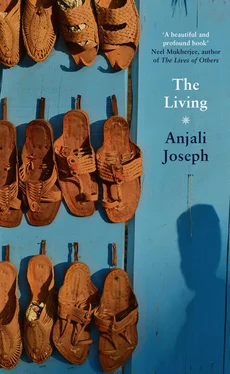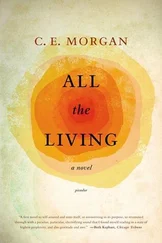1 ...8 9 10 12 13 14 ...30 Borkar had a bag. He took out three tumblers. The first bottle was opened. I’d drunk alcohol as a young man, but only a taste; I hadn’t enjoyed it. I swigged as much as the others, and my stomach began to burn. The orange flavour was intense, like cheap perfume. I thought of Ratna and felt nostalgic.
Borkar said, This is better than sitting at home.
Satpute agreed. I looked at his drawn, yellow face, missed my dinner, and said to myself, I am just seeing what this is like, I won’t do it regularly.
A warm breeze sighed in the leaves of the banyan tree, and tickled my neck. Perhaps I’d spent too much time alone.
What are you chewing over? Borkar asked. There was an insensitivity about him, a humanity too, a warmth. I made these assessments as my father would have; my father who had always been, as far as I knew, so upright.
It’s new to me to be among other men, I said. Not since I was younger, before I was married probably.
Don’t you get bored at home? Satpute asked.
Bored, I said. I don’t know. I felt the urge to defend my family. And was it boredom, or fear, the fear of being responsible, day after day, but with no idea how to go about things?
Leave him alone, Borkar said. He waved a fat paw at me.
There’s no need to be uncomfortable, Satpute said. His smile showed browning teeth.
What about that woman of yours? Borkar asked.
I started, but it was Satpute who shrugged. It’s going on, he said. Sometimes.
He too? The remaining light was orange, that orange dusk. Bats wheeled about the godown and the tree.
It’s eerie here, I said, a little ghostly. This light.
They laughed. Pawar is a sensitive soul, Satpute said.
I laughed too, uneasily. A friend of my grandfather told us a story when I was younger, I said. A man was walking home along a dark road near a forest.
Where was this? Satpute interrupted.
Bengal, I said, plucking the name out of the air.
Bengal? How would you know a story from Bengal?
I drank some more. Are you going to let me tell the story or not? I said.
He gave a dry laugh. Tell, tell, he said.
He had no light and was afraid of ghosts. But a fellow traveller with a lantern came along and kept him company. The first man was relieved.
Of course, Borkar said.
Satpute laughed. Were you there too, in Bengal?
Satpute, don’t be an idiot. Who wants to walk alone near a forest?
I said, The two men talked and got to know each other. After a while the first man told the man with the lantern that when they met on the road he’d been afraid in case the other man was a ghost.
Oho! said Borkar, pouring more santra for all of us. I took my tumbler and put it against my foot so I’d know where it was. The sky was nearly dark. Even the bats were hardly visible, cinders against the darkness. It was silent. The city lights were far away. I thought of the field temple I used to walk to as a boy, its blunt found idols of Narsoba and his wives. I must be tipsy. The physical world slid away at an oblique angle.
Then what happened? Satpute said. He was a rough voice now, a few feet away in the dark.
Oh. Then the first man said he remembered it was all right because ghosts who take human form have feet that point backwards.
Ah, of course, said Borkar, as though this was well known.
I paused. Then the man carrying the lantern laughed, pointed it at his feet, and disappeared, I said.
Ah! So he was a ghost, Borkar said.
What do you think? I said. In the silence, I heard the crickets.
We should have had boiled peanuts, Satpute said. Something.
I was hungry too. Next time I’ll bring something savoury, I said. My wife makes good chivda.
Chivda! We should have meat. Kebabs.
A confusion of acid moved in my stomach. My head began to float.
At first I enjoyed the uselessness of those evenings. We were like children, smutty children, it’s true, but there was an innocence to it. I enjoyed being drunk, I discovered, the way things would suddenly loom closer, then swim back. It was like the way you get to know someone, like getting to know Ratna: those overwhelming moments of too much proximity, followed by retreating into distance.
*
Chaturthi was on a Sunday. After we took the children to the temple to see the idol, the rest of our stay was quiet. Mukta bai came in the mornings to cook. The house smelled of phenyl for hours after she’d cleaned. At lunch my wife would make bhakris. Then she’d watch television, and I’d rest. I’m not used to sleeping in the afternoon, but in the city it’s possible to feel tired without doing much.
Two days before we were to leave I lay on Sohan’s bed and felt myself slipping into unconsciousness. I stayed there a long time, it seemed, on the boundary between two states. Here in this house, and in my near-dream, the furniture of my life fell away. My things at home — the cupboard, the bed, Tuka with his orange fur and green eyes, the cracked bucket — seemed to be part of a dream. Like scraps of leather, oddly shaped, things from life, sayings, objects, found themselves spliced together. My father, walking past me, holding one chappal. My brother, stolid next to me outside the old house. In the dream he and I were talking about his daughter, whom he wants to marry off this winter. She’s seventeen, a bright, calm girl.
Eventually I got up and went to the kitchen for tea.
We’ll take a walk, she said, before the boys come home? I want to make sabudana vada for them.
Groggy, I sat at the table, reassembling the world, which wasn’t mine. Tablecloth with pictures of fruit, ceiling fan, salt shaker. Photographs on a board behind the table. Pictures of the children, round-faced, Rohan serious, Sohan smiling. None of it real. Did I have to go? Yes — no, I wasn’t sure. Perhaps not yet.
We walked up the lane and turned right. We looked different from the other people around, she in her nine-yard sari, and I in my shirt and wide pyjamas. Or perhaps it wasn’t what we were wearing. There aren’t many people of our age in this area, and few people around in the daytime. Everyone’s working or at school. She smiled at a watchman we’ve passed before, and a man selling sukha bhel.
How do you know all these people when we’ve just been here a few days? I grumbled.
I don’t walk around pretending the world doesn’t exist, she said.
Sometimes I think I’m the one who doesn’t exist, I said. My penis twinged. Could I need to go again?
Oh, you exist, she said drily.
Sanjay wants to marry off Sangita, I said. He should let her study a bit longer, let her work.
But you knew this. What do you think she should work as?
Something. She could move to the city. She might want to train, work in a beauty parlour, she said. What’s the point of just getting her married? I said. Half my mind was on my dream, half on the probably misleading urgency I was experiencing.
A koel screeched in a tree as we passed.
Quiet! I said.
She began to laugh.
The koel screamed louder and louder.
These city birds are deranged, I said.
You don’t think she should be married? she said.
What’s the hurry? I said. Of course she should. But why now? She’ll just become an accessory to her husband’s life. What’s the value of that?
I was sure now. I did need to go. Let’s go back, I said.
She stopped. It seemed to me suddenly that she was trembling. But I don’t want to go back yet, she said.
Come on, I urged. I need to get back. Don’t delay.
She stood irresolute.
Or take your time, if you want, I said. Give me the key. I hurried back, past the screaming koels. When I got to the bathroom, I leaked a few hot drops. She had come back too, but when I went to the kitchen where she was frying the vade, she didn’t look at me.
Читать дальше
Конец ознакомительного отрывка
Купить книгу











